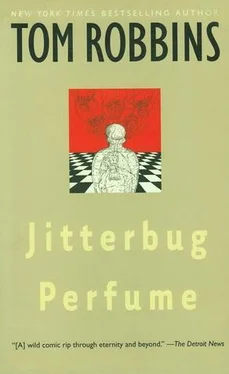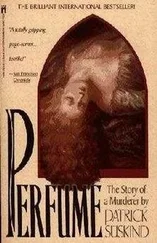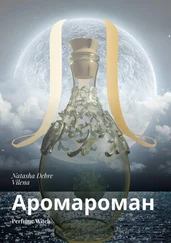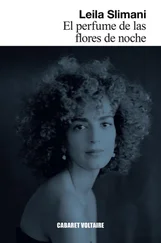At some later point, it might be rewarding to examine Dannyboy's arguments. For the moment, let it suffice to say that he has connected air to breath, water to bath, earth to food, and fire to sex, supplying a mixture of empirical fact and medical theory to support his case for the life-extending properties of this quartet, when ritualistically and resolutely embraced.
In addition, Dr. Dannyboy has suggested a fifth element: positive thought. Pointing out that their breathing, bathing, dining, and screwing brought Alobar and Kudra much physical pleasure, and that an organism steeped in pleasure is an organism disposed to continue, he has said that the will to live cannot be overestimated as a stimulant to longevity. Indeed, Dr. Dannyboy goes so far as to claim that ninety percent of all deaths are suicides. Persons, says Wiggs, who lack curiosity about life, who find minimal joy in existence, are all to willing, subconsciously, to cooperate with — and attract — disease, accident, and violence.
Enough for now. In urbanized, technologized society — that institutional home for the orphans of Pan — there may be few who can even relate anymore to the Four Elements. At least not in any primal sense. V'lu Jackson, for example, once inquired of Madame Devalier if the Four Elements weren't some Motown jive group, while Ricki the bartender has defined the Four Elements as cocaine, champagne, pussy, and chocolate.
Paris. April. Twilight. A few flat clouds folded themselves like crepes over fillings of apricot sky. Pompadours of supper-time smoke billowed from chimneys, separating into girlish pigtails as the breeze combed them out, above the slate rooftops. Chestnut blossoms, weary from having been admired all day, wore faint smiles of anticipation with the approach of the private night. Or else the blossoms were being tickled by the sleepy insects that were entering them as if they were hotels. Stiff-legged corks squeaked loose from bottlenecks where they'd stood guard since noon. Stiff-legged nags, tiny harness bells jingling, dragged market carts toward the suburbs. At intervals along the boulevards, lamplighters set their gay fires. A wounded tongue licked the shine off cathedral domes. A bat broke loose from a belfry, a loaf broke loose from an oven, six chimes broke loose from a clock. Everywhere a huge, enveloping softness; soft as face powder, soft as petticoats, soft as the snuff in a courtesan's box.
Now, the clock chimed seven times. Nightfall was almost complete. The softness was suddenly interrupted by harsh hoofbeats, not four hooves, oddly enough, but two, striking a stone bridge — clink! clink! — upon which no beast could be seen to trod; and the peachy, powdery softness was further violated by a release of fumes so fetid it seemed almost evil. Clink! clink! Sparks were struck from cobblestones. Clink! clink! To the innocent nostrils of spring there was caterwauled a filthy serenade.
Pan had waited until dark to return home so that he might more stealthily transport the wig stolen from Descartes's redundant funeral. He'd not eaten since early morning, and to the scrape of his hooves (not meant for city streets) and the blast of his stench (meant for no place save the rutting grounds) were added stomach growls, terrible and rude. From grass, he had woven a short rope, which he tied to the wig so that he might pull it along behind him. In the dim light, those pedestrians who saw it scurrying up the street believed it to be blown along by the breeze. Several gave pursuit, only to have it yanked away each time they thought they had it in their grasp. One by one, they gave up. “It stinks, anyway,” said the last to quit the chase. And Pan arrived at the incense shop with wig in tow, having painted the gentle April gloaming with shades of Halloween.
Ceremoniously, Pan presented the wig, frescoed now with grit and offal, to Alobar. Were Alobar bewigged, Pan reasoned, he could hold the white hairs of age at bay for as long as he wished, and no outsider would be the wiser. With that pressure removed, maybe Alobar and Kudra would curtail their quarreling, maybe the household would be merry again.
As it turned out, Pan found his hosts in a quite congenial mood already. When, that afternoon, the latest candidate for a base note had fallen short of expectations, they had sat down over a flagon of wine and negotiated an agreement to dematerialize.
For a week, they fasted. They meditated for hours each day and bathed repeatedly. They made love between baths but resisted climax, holding the orgasmic cyclone inside themselves, channeling it up their spinal columns to their brains. Then, one afternoon, the green blush of April still upon the city, they closed the shop an hour earlier than usual and climbed the stairs, one of them for the last time.
The experiment was to be conducted in their small sitting room. After a brief discussion about whether or not they should disrobe, they concurred that nudity might distract Pan, who was to monitor the attempt, and they remained, but for their shoes, fully clothed. Upon the threadbare carpet, a far cry from the rugs that had purred to their buttocks in Constantinople, they sat cross-legged, facing one another. They closed their eyes and. .
Just then there was a commotion in the street. Excited voices were being raised outside their shop. Alobar asked Pan to investigate. “I be a god not an errand boy,” grumbled the old faun, but he hobbled downstairs nevertheless.
The ruckus was caused by the monks. For more than a year, ever since Pan moved into the neighborhood, things had not been right at the monastery. The good brothers had become increasingly plagued by erotic dreams. Dreams of a lascivious nature are fairly common among those of whom the church requires celibacy, but the frequency and intensity of the dreams on rue Quelle Blague had the confession booth smoking. Some monks had begun to resist sleep and walked about heavy-lidded and nervous. Others lived for bedtime and during the day appeared drained, weak, disinterested. Rome dispatched an exorcist to uproot their torment, but the sticky demons mocked his incantations: he, himself, was visited by a succubus of such seductive talent that upon awakening he packed his exorcisory tools and returned to the Vatican.
The abbot, too, was stricken. At least twice a week he was stiffened by creamy visions; the other nights, he told his confessor, he dreamed “of rabbits caught in snares, of snakes that swallow birds' eggs whole, of trailing vines that threaten to trip me up, of rockslides, ewes in foal, yammering hornets, belching vultures, yellow eyes that peer out from hollow trees, and all manner of disagreeable things such as Satan has strewn about God's perfect world, things such as I have not seen since my boyhood in rural Provence.”
The monks under his authority were subject to these “rural” nightmares as well. If they weren't being tortured by the rub of feminine thighs, they were being nauseated by the drool of he-bears eating their cubs. Late in the evening, a person afoot on rue Quelle Blague might, by the moans and shrieks and saccadic protests, have imagined themselves passing not a monastery but a hospital or a brothel or a combination of the two.
More and more, the monks came to suspect that the incense shop was the source of their collective possession. Despite the aromatic stuffs that were its stock in trade, there was often a gamey odor about the place, “a smell,” as the abbot put it, “of such wild meats as country rogues doth eat.” Never had the shop's owners been seen at Mass, there was a quality of physical wellbeing about them that was nearly supernatural, and the woman — the woman was perversely proportioned and jiggled shamelessly when she walked. Several monks claimed that she, specifically, haunted their cots of a night.
Still, the two shopkeepers were good customers of the perfumery and were known to cooperate in the acquisition of raw materials. Moreover, the dream epidemic had attacked the monastery but a year before, while the shop had been operating for well over a decade. The superiors urged restraint in placing blame, but accusations were whispered almost daily, and when, with the soft airs and fertile moistures of spring, the dreaming in the cubicles reached a hysterical pitch, small knots of agitated monks began to patrol the block, eager, it seemed, for something demonic to reveal itself.
Читать дальше












